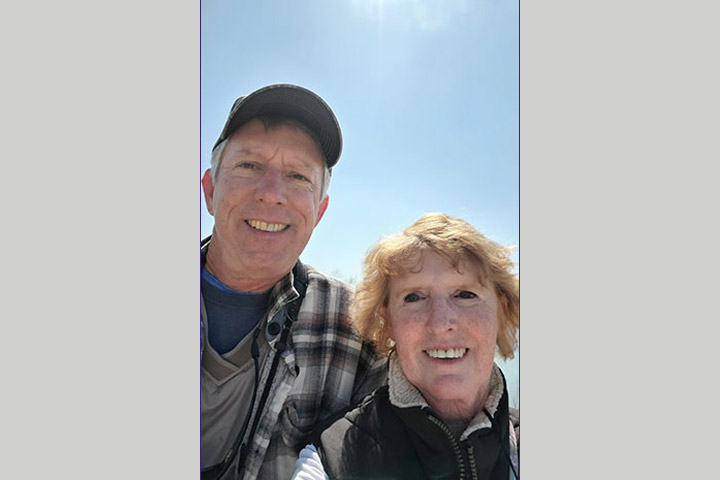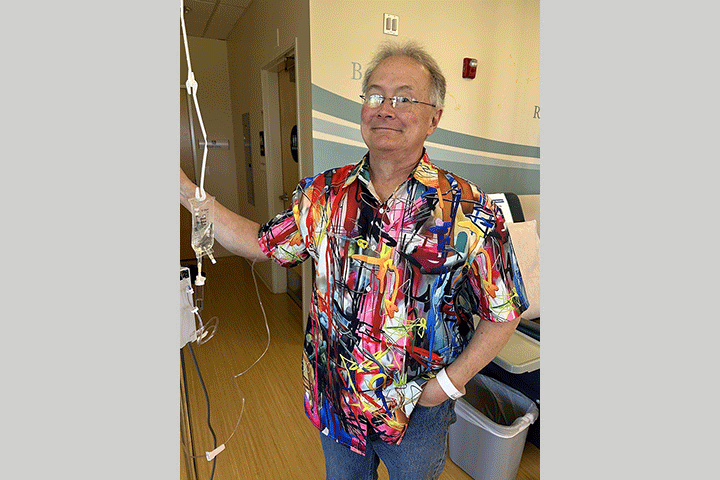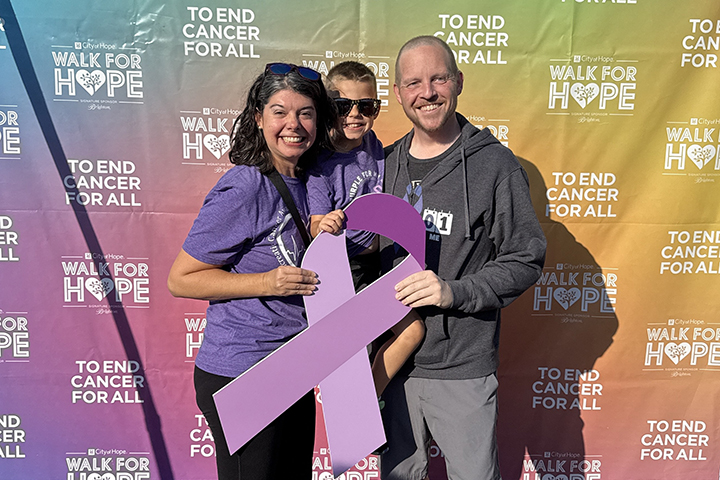Genetic Profiling Leads to a Clinical Trial

- NRG1 fusion genetic mutation
- Independent virtual tumor board
- Clinical trial for MCLA-128
Devastated and scared.
That’s how I felt after being diagnosed with stage IV pancreatic adenocarcinoma in January 2021. I was 61 years old and never saw it coming. I was chronically tired, which I thought was normal for someone my age. But when I had a sudden onset of pain I went to the doctor. An ultrasound found a mass on my liver. A follow-up CT scan found tumors on my pancreas and eventually confirmed my diagnosis.
Needing More
My late-stage diagnosis indicated that the disease had metastasized and spread to other organs. Surgery wasn’t an option. The treatment offered to me locally was limited to chemotherapy. There were no further testing or treatment options beyond that. This was not robust enough or aggressive enough for me. I live in rural southeastern Ohio, and I knew I needed more.
Chemotherapy and Genetic Testing
I decided to seek treatment at The James (The Ohio State University Comprehensive Cancer Center), in Columbus, a larger hospital than the one near my home. I was treated with gemcitabine and Abraxane. After more than ten months of chemotherapy, my tumor had shrunk only a little. The chemotherapy caused neuropathy and neutropenia, so when Abraxane was temporarily unavailable I decided to try a clinical trial.
As part of my treatment, the doctors at The James performed genetic profiling on my tumor. The results showed a rare, but targetable, gene fusion known as NRG1. This was good and bad news. While NRG1 is a driver for cancer growth, it is receptive to treatments being tested in many trials right now.
After loads of online research, I decided to submit my case to an independent virtual tumor board through Cancer Commons to get an unbiased review of my treatment options. I made sure to include the results of my genetic testing in the consultation. The board recommended a clinical trial that would target my cancer’s NRG1 fusion.
I found that Dr. Mohammed Najeeb Al Hallak was doing this clinical trial at the Barbara Ann Karmanos Cancer Institute at Wayne State University in Detroit, Michigan. Despite being more than 300 miles from our home, Karmanos was the closest hospital offering this clinical trial. I later found out that Karmanos regularly offers 250 active trials, which is very encouraging!
Participating in a Clinical Trial
Dr. Al Hallak said I was a good candidate for his trial involving MCLA-128 (drug name zenocutuzumab). In December 2021 I signed up for the clinical trial and hoped for the best.
My husband John and I have made the four-and-a-half-hour trip to Detroit every two weeks so I can receive the experimental drug intravenously. Because of the length of the trip we stay overnight before the treatment. Merus, the drug company that produces zenocutuzumab (MCLA-128), reimburses our travel expenses as part of the clinical trial. So far I haven’t had any side effects from the treatment.
Merus has recently received FDA approval for a Breakthrough Therapy designation for zenocutuzumab (MCLA-128) which will hopefully lead to full approval of the drug for pancreatic cancer patients with NRG1+ fusions.
The staff at Karmanos Cancer Institute has been wonderful! Karmanos has a number of ongoing trials and at last count at least 23 trials dealing with pancreatic cancer. Many drug companies reimburse travel expenses and medical costs associated with their clinical trials.
Positive Results
In February 2022 my PET scan results showed no visible tumors. My scans six months later showed the same results. I have completed a year and a half of the three-year trial and my body has no measurable tumors or signs of metastatic disease. I feel great! I look forward to living many happy and healthy years with my husband. The trial has been a great success for me and will hopefully continue to keep my cancer in remission.
I encourage everyone that has been diagnosed with pancreatic cancer to get genetic profiling on their tumors and to look for clinical trials that target their unique needs. Use the resources found on Let’s Win and those available through the Pancreatic Cancer Action Network (PanCAN) and Cancer Commons to help determine what clinical trials are available.
The Chance to Survive
For me, clinical trials were the best answer—with my diagnosis I felt like I had nothing to lose. If my current clinical trial fails, I will try to enroll in another one. This is my best chance to survive and I am glad to be contributing to research that will lead to a cure for pancreatic cancer.
I am about to celebrate two and a half years since my stage IV pancreatic adenocarcinoma diagnosis. I am currently cancer free and feeling great! I am forever grateful to Cancer Commons for suggesting this trial and Dr. Al Hallak and the staff of Karmanos Cancer Institute for the great care I have received and the opportunity to participate in a targeted trial for my pancreatic cancer.





